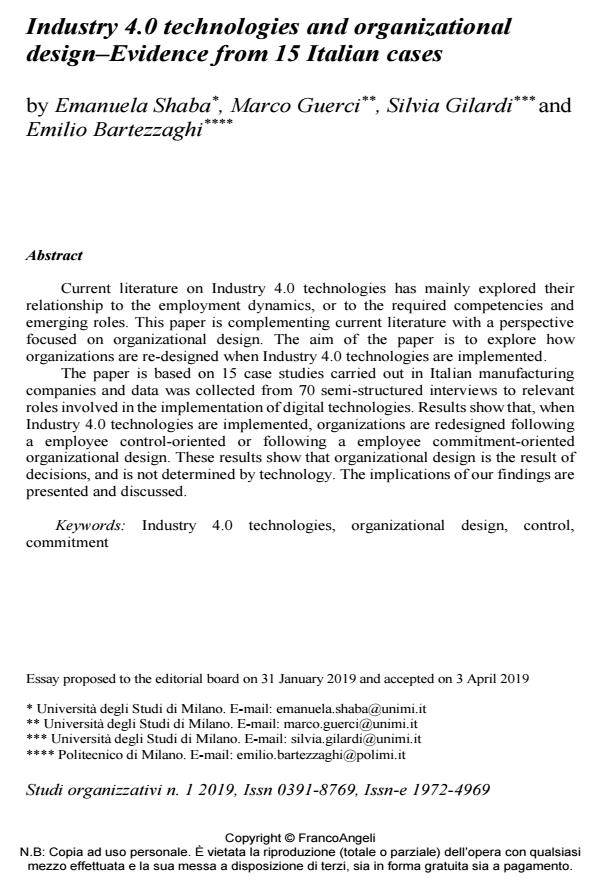Industry 4.0 technologies and organizational design - Evidence from 15 Italian cases
Journal title STUDI ORGANIZZATIVI
Author/s Emanuela Shaba, Marco Guerci, Silvia Gilardi, Emilio Bartezzaghi
Publishing Year 2019 Issue 2019/1
Language English Pages 29 P. 9-37 File size 472 KB
DOI 10.3280/SO2019-001001
DOI is like a bar code for intellectual property: to have more infomation
click here
Below, you can see the article first page
If you want to buy this article in PDF format, you can do it, following the instructions to buy download credits

FrancoAngeli is member of Publishers International Linking Association, Inc (PILA), a not-for-profit association which run the CrossRef service enabling links to and from online scholarly content.
Current literature on Industry 4.0 technologies has mainly explored their relationship to the employment dynamics, or to the required competencies and emerging roles. This paper is complementing current literature with a perspective focused on organizational design. The aim of the paper is to explore how organizations are re-designed when Industry 4.0 technologies are implemented. The paper is based on 15 case studies carried out in Italian manufacturing companies and data was collected from 70 semi-structured interviews to relevant roles involved in the implementation of digital technologies. Results show that, when Industry 4.0 technologies are implemented, organizations are redesigned following a employee control-oriented or following a employee commitment-oriented organizational design. These results show that organizational design is the result of decisions, and is not determined by technology. The implications of our findings are presented and discussed.
Keywords: Industry 4.0 technologies, organizational design, control, commitment
- Digital Technologies for Entrepreneurship in Industry 4.0 Irene Borreca, Stefano Di Lauro, pp.43 (ISBN:9781668442654)
- Resilience in a Digital Age Francesca Sgobbi, Lino Codara, pp.309 (ISBN:978-3-030-85953-4)
- Le condizioni organizzative e professionali dello smart working dopo l'emergenza: progettare il lavoro ubiquo fatto di ruoli aperti e di professioni a larga banda Federico Butera, in STUDI ORGANIZZATIVI 1/2020 pp.141
DOI: 10.3280/SO2020-001006 - Increasing Supply Chain Performance in Digital Society Myriam Ertz, Adam Skali, pp.278 (ISBN:9781799897156)
- Tecnologia, organizzazione e lavoro nella quarta rivoluzione industriale: due studi di caso comparati nel settore manifatturiero Lino Codara, Francesca Sgobbi, in SOCIOLOGIA DEL LAVORO 157/2020 pp.225
DOI: 10.3280/SL2020-157012 - 36th Bled eConference – Digital Economy and Society: The Balancing Act for Digital Innovation in Times of Instability: June 25 – 28, 2023, Bled, Slovenia, Conference Proceedings Paul Morsch, Willemijn van Haeften, Pascal Ravesteyn, Guido Ongena, pp.560 (DOI:10.18690/um.fov.6.2023.36)
- The Elephant in the Room: New Skills and Work Dimensions of Turkish White Goods Industry Engineers in Industry 4.0 Era Kübra Şimşek Demirbağ, Nihan Yıldırım, in IEEE Transactions on Engineering Management /2024 pp.7863
DOI: 10.1109/TEM.2023.3297516 - Does digitizing involve desensitizing? Strategic insights into the side effects of workplace digitization Rocco Palumbo, in Public Management Review /2022 pp.975
DOI: 10.1080/14719037.2021.1877796 - 2020 5th International Conference on Smart and Sustainable Technologies (SpliTech) Luca Cremona, Nicola Carrus, Ilaria Sergi, Luigi Patrono, pp.1 (DOI:10.23919/SpliTech49282.2020.9243719)
- Connectivity and human capacity in digital transformation: the exploratory hypotheses of hyper industrial Emiliana Armano, Salvatore Cominu, Kristin Carls, Marco Briziarelli, in STUDI ORGANIZZATIVI 1/2021 pp.146
DOI: 10.3280/SO2021-001007 - How to support the implementation of Smart Human Resources 4.0 at the enterprise level: The role of leadership and organizational structure Nadežda Jankelová, Natália Mišíková, Katarína Remeňová, in Strategic Management /2026 pp.99
DOI: 10.5937/StraMan2600001J - The Role of Governments in Driving Industry 4.0 Adoption in Emerging Countries Muhammad Mohiuddin, Mohammad Nurul Hassan Reza, Sreenivasan Jayashree, Md Samim Al-Azad, Slimane Ed-dafali, in Journal of Global Information Management /2023 pp.1
DOI: 10.4018/JGIM.323439 - Information Technology and Systems Borja Bordel, Ramón Alcarria, Gema de la Torre, Isidoro Carretero, Tomás Robles, pp.646 (ISBN:978-3-030-96292-0)
- C'è una rivoluzione in corso e il lavoro ne è pienamente investito Giorgio De Michelis, in STUDI ORGANIZZATIVI 1/2023 pp.120
DOI: 10.3280/SO2023-001006
Emanuela Shaba, Marco Guerci, Silvia Gilardi, Emilio Bartezzaghi, Industry 4.0 technologies and organizational design - Evidence from 15 Italian cases in "STUDI ORGANIZZATIVI " 1/2019, pp 9-37, DOI: 10.3280/SO2019-001001